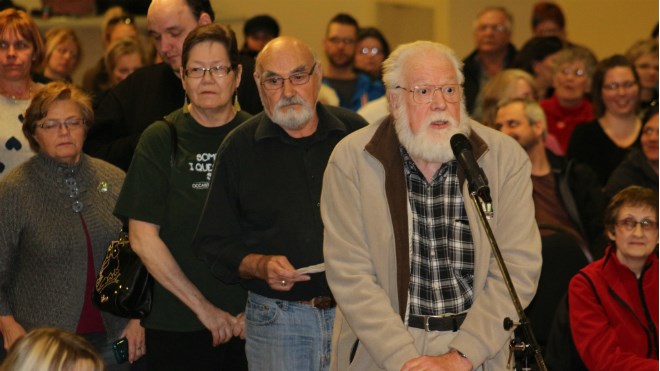Mehra spoke at a public forum Tuesday night that gathered local union and community leaders, and health care workers, to discuss the impact proposed staff reductions at Health Sciences North will have on Sudbury and northeastern Ontario.
The Ontario Nurses' Association said nursing cuts Health Sciences North will result in around 85,000 fewer hours of patient care in the next fiscal year.
The association said March 17 the hospital will cut 42 nursing positions. While the lost positions won't translate to 42 layoffs, the union said the reduced nursing hours will impact care at Health Sciences North.
At Tuesday's public forum, Dave Shelefontiuk, the president of CUPE Local 1623, who represents clerical and service staff at the hospital, said the hospital will cut more than 10,200 hours for clerical staff, and 20,000 hours from service positions.
Clerical staff include secretaries and maintenance staff who handle many of the hospital's day to day activities, while the service workers include registered practical nurses and personal support workers, who provide direct patient care.
“They expect a lot more with a lot less, which is not going to be possible,” Shelefontiuk said. “Make no mistake, it will never be the same.”
But in an email to NorthernLife.ca last week, hospital spokesperson Dan Lessard said Health Sciences North will look to reduce nursing hours by not filling existing vacancies, and reducing part-time, call-in and overtime hours.
“We will also use attrition and early retirement where appropriate, so we’re doing everything we can to avoid actually laying off people,” he said in an email to NorthernLife.ca.
Lessard also said that in some units nursing cuts will not result in fewer hours of patient care, because any lost nursing positions will be replaced by other health-care workers.
“So for example, we may be reducing hours of one type of health care worker in a unit, such as RNs (registered nurses), but replacing it with another category of health care worker, such as RPNs (registered practical nurses) or PSWs (personal support workers), and vice-versa,” he said.
“Those employees are represented by different unions, so while one union may have fewer hours or positions on its books, the other union actually gains positions, and there is no loss of hours in care to our patients, merely a change in who is providing that care.”
But Mehra, the Ontario Health Coalition's executive director, said personal support worker and registered practical nurse positions are also on the hospital's chopping block.
“For eight years funding has not kept pace with inflation,” she said.
And for three years, the province has not increased Health Sciences North's budget.
“The minute you walk in the door they're trying to figure out how to get you out,” Mehra said.
Many members of the audience Tuesday night – who numbered more than 300 – shared their experiences about the care they've received at Health Sciences North.
Ontario Public Services Employees Union (OPSEU) executive board member Felicia Fahey said her 94-year-old grandmother did not have a proper hospital bed for three days after she fell and injured herself.
Instead she had to lie on a stretcher in a hallway.
In addition to staff reductions, Mehra said Health Sciences North is expected to cut four hospital beds.
“I draw the line when you cut programs and services to the people who need them,” said Nickel Belt MPP France Gélinas, who attended Tuesday's public forum.
While hospitals discharge patients as quickly as possible, Gélinas said the province's home care system is not equipped to handle the patient load.
She said home care should be a preventative measure, to prevent, or delay, people from getting gravely ill in the first place.
But instead, Gélinas said, people tend to receive home care after they are discharged from hospital, and are already acutely ill.
The Ontario Health Coalition and several unions representing hospital workers are planning a meeting Wednesday, April 1, at 866 Newgate Avenue, to plan a response to the proposed cuts at Health Sciences North.
The meeting begins at 7:30 p.m. and organizers said all are welcome to attend.
Join Sudbury.com+
- Messages
- Post a Listing
- Your Listings
- Your Profile
- Your Subscriptions
- Your Likes
- Your Business
- Support Local News
- Payment History
Sudbury.com+ members
Already a +member?
Not a +member?
Sign up for a Sudbury.com+ account for instant access to upcoming contests, local offers, auctions and so much more.
